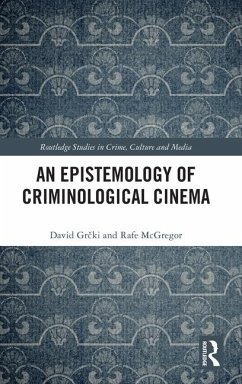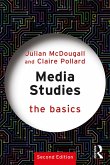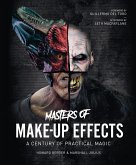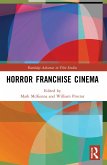Standing at the intersection of criminology and philosophy, this book demonstrates the ways in which mythic movies and television series can provide an understanding of actual crimes and social harms.
Taking three social problems as its subjects - capitalist political economy, structural injustice, and racism - the book explores the ways in which David Fincher's Fight Club (1999), HBO's Game of Thrones (2011-2019), and Jordan Peele's Us (2019) offer solutions by reconceiving justice in terms of personal and collective transformation, utopian thinking, and the relationship between racism and elitism, respectively. In doing so, the authors set out a theory of understanding the world based on cinematic and televisual works of art and conclude with a template that establishes a methodology for future use.
An Epistemology of Criminological Cinema is authoritative and accessible, ideal reading for undergraduate and postgraduate students, criminologists, philosophers, and film, television, and literary critics with an interest in social justice and social harm.
Taking three social problems as its subjects - capitalist political economy, structural injustice, and racism - the book explores the ways in which David Fincher's Fight Club (1999), HBO's Game of Thrones (2011-2019), and Jordan Peele's Us (2019) offer solutions by reconceiving justice in terms of personal and collective transformation, utopian thinking, and the relationship between racism and elitism, respectively. In doing so, the authors set out a theory of understanding the world based on cinematic and televisual works of art and conclude with a template that establishes a methodology for future use.
An Epistemology of Criminological Cinema is authoritative and accessible, ideal reading for undergraduate and postgraduate students, criminologists, philosophers, and film, television, and literary critics with an interest in social justice and social harm.
"Engaging and challenging, this book posits the value and usefulness of the term 'criminological cinema'. Grcki and McGregor offer an important philosophical engagement with criminology around a central but neglected facet of understanding: epistemology. Using case studies, they examine concepts of social harm and (in)justice, to illustrate that cinema has a valuable epistemological and pedagogical role in criminological analysis." - Professor Jon Frauley, University of Ottawa
"A timely and original contribution working at the intersection of criminology and epistemology, Grcki and McGregor argue that screen stories which have epistemic and moral value can be used to reconceptualize justice, improving people's lives and changing the world for the better. The discussion of examples makes their argument insightful and the reading absolutely enjoyable." - Professor Íngrid Vendrell-Ferran, University of Marburg
"In this compelling and innovative book, Grcki and McGregor forge new paths for criminological engagement with cinema. Masterfully drawing together epistemic threads, they highlight and enliven existing affinities between zemiology and criminology. Beyond visual criminology, crime and media, there are new analytical frontiers where cinematic images are taken into account alongside the social and material forces of harm. Grcki and McGregor offer some of the first explorations of those frontiers. For anyone teaching, researching, or reading at the intersection of harm, criminology, and cinema, this is a must-have book." - Dr Bill McClanahan, University of Tennessee, Knoxville
"A timely and original contribution working at the intersection of criminology and epistemology, Grcki and McGregor argue that screen stories which have epistemic and moral value can be used to reconceptualize justice, improving people's lives and changing the world for the better. The discussion of examples makes their argument insightful and the reading absolutely enjoyable." - Professor Íngrid Vendrell-Ferran, University of Marburg
"In this compelling and innovative book, Grcki and McGregor forge new paths for criminological engagement with cinema. Masterfully drawing together epistemic threads, they highlight and enliven existing affinities between zemiology and criminology. Beyond visual criminology, crime and media, there are new analytical frontiers where cinematic images are taken into account alongside the social and material forces of harm. Grcki and McGregor offer some of the first explorations of those frontiers. For anyone teaching, researching, or reading at the intersection of harm, criminology, and cinema, this is a must-have book." - Dr Bill McClanahan, University of Tennessee, Knoxville








